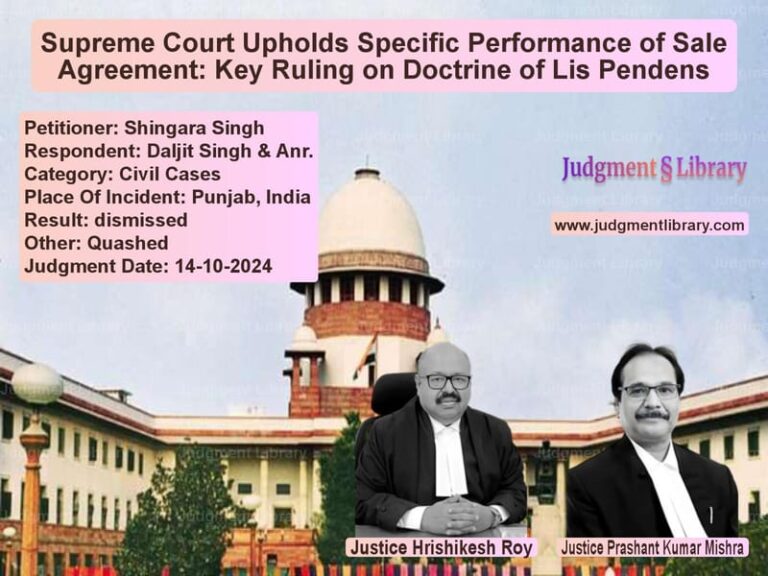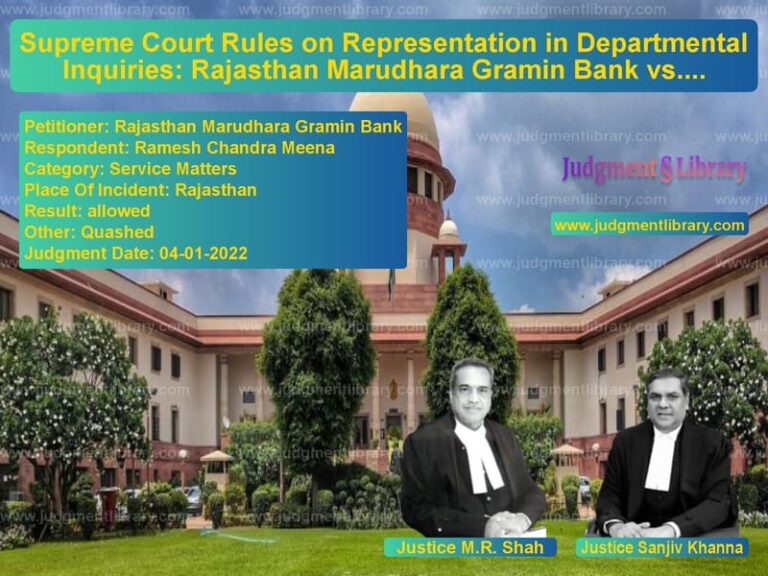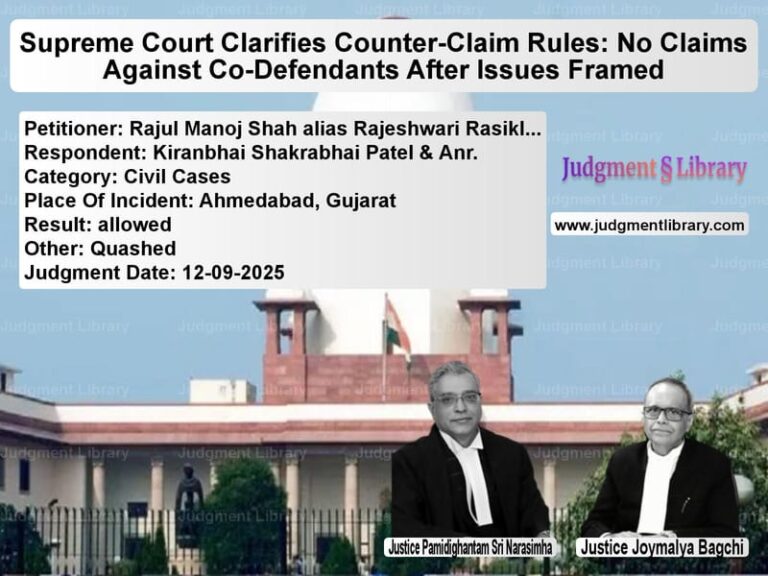Supreme Court Upholds Validity of Will in Inheritance Dispute: Key Ruling on Probate Law
The Supreme Court of India recently delivered a landmark judgment in the case of Derek A. C. Lobo & Ors. v. Ulric M. A. Lobo (Dead) By LRs & Ors., dealing with the validity of a disputed Will. This case revolved around a probate application turned civil suit, examining key aspects of testamentary succession, burden of proof in Will disputes, and the principles governing suspicious circumstances surrounding Wills.
Background of the Case
The dispute arose over a Will executed by Cecilia Gertrude Lobo on November 10, 1992. Following her demise, her sons, Dr. Derek A.C. Lobo and Cedric P.A. Lobo, applied for probate as joint executors. However, the Will was challenged by some of her other children, leading to a full-fledged suit under Section 295 of the Indian Succession Act, 1925.
Read also: https://judgmentlibrary.com/supreme-court-remands-land-fragmentation-case-for-fresh-consideration/
Initially, the Trial Court decreed the suit in favor of the plaintiffs, granting probate. However, the Karnataka High Court reversed this decision, citing ‘suspicious circumstances’ surrounding the Will. This prompted the appellants to challenge the ruling before the Supreme Court.
Legal Issues Raised
- Was the execution of the Will validly proven under Section 63 of the Indian Succession Act?
- Did the presence of suspicious circumstances render the Will invalid?
- Were the beneficiaries unduly involved in the drafting and execution of the Will?
- What is the burden of proof on the propounder of a Will in cases of challenge?
Arguments of the Appellants (Propounders of the Will)
- The Will was executed in accordance with Section 63 of the Indian Succession Act, 1925.
- One of the attesting witnesses, Gregory Paris, was examined and confirmed the due execution of the Will.
- There was no evidence suggesting coercion, undue influence, or fraud.
- Suspicious circumstances cited by the High Court were either legally untenable or had already been addressed.
- The testatrix, though suffering from arthritis, was mentally sound and capable of executing the Will.
Arguments of the Respondents (Challengers of the Will)
- The Will was executed under suspicious circumstances.
- The prominent participation of beneficiaries in the drafting and execution cast doubt on its authenticity.
- Some heirs were disinherited without a clear reason.
- The testatrix was in severe pain due to arthritis, raising questions about her ability to comprehend the document.
- The advocate who prepared the Will was not examined.
- Some properties were sold before the grant of probate, suggesting undue haste and manipulation.
Supreme Court’s Observations
1. Execution of the Will Was Duly Proven
The Court emphasized that under Section 63 of the Indian Succession Act and Section 68 of the Indian Evidence Act, proving a Will requires examination of at least one attesting witness. In this case, Gregory Paris was examined and confirmed that the testatrix executed the Will in his presence.
2. Suspicious Circumstances Do Not Invalidate the Will
The Supreme Court carefully scrutinized the alleged suspicious circumstances cited by the High Court and ruled that they were insufficient to render the Will invalid:
- The testatrix was a literate, socially active individual who understood legal documents.
- She had studied up to SSLC and served as a municipal councilor and trustee in various organizations.
- Her affliction with arthritis did not impair her mental faculties.
- There was no coercion or undue influence in the execution process.
3. Beneficiaries’ Presence Does Not Nullify the Will
The Court ruled that the mere presence of beneficiaries during the execution of a Will does not automatically invalidate it. There must be clear evidence of coercion or undue influence, which was absent in this case.
4. Burden of Proof in Will Disputes
The Court reiterated that the initial burden of proving a Will lies on the propounder. Once this is discharged, the onus shifts to the challenger to establish fraud, coercion, or suspicious circumstances.
5. No Legal Mandate to Examine Drafting Advocate
The Court held that failure to examine the lawyer who drafted the Will does not automatically create suspicion, especially when other witnesses have testified about the execution process.
6. Previous Land Transactions Not Relevant
The Court found that the sale of properties before the grant of probate was unrelated to the question of the Will’s validity.
Final Judgment
- The Supreme Court set aside the Karnataka High Court’s judgment.
- The decision of the Trial Court granting probate was restored and confirmed.
- The Will of Cecilia Gertrude Lobo was deemed valid and enforceable.
- The contesting respondents’ objections were dismissed.
Key Takeaways
1. Proving a Will Requires Compliance with Section 63 of the Indian Succession Act
Testators must execute Wills with proper attestation, and at least one witness must testify to its execution.
2. Suspicious Circumstances Must Be Substantial
The presence of beneficiaries during execution or exclusion of certain heirs does not automatically invalidate a Will.
3. Beneficiaries Can Be Present During Execution
Unless coercion or fraud is proven, mere participation in the execution process does not raise valid objections.
4. Mental Soundness Prevails Over Physical Ailments
The presence of physical illness, such as arthritis, does not imply lack of mental competence.
5. Courts Must Not Be Overly Skeptical
Courts should not reject a Will based on theoretical suspicions without substantive proof.
Conclusion
The Supreme Court’s ruling in this case sets an important precedent in testamentary succession law. It reinforces the principle that a Will, if duly executed and proven, should not be lightly set aside based on vague suspicions. The judgment provides clarity on the burden of proof, the role of beneficiaries in execution, and the importance of verifying allegations of undue influence. This decision ensures that rightful heirs receive their inheritance without undue legal hurdles.
Petitioner Name: Derek A. C. Lobo & Others.Respondent Name: Ulric M. A. Lobo (Dead) By LRs & Others.Judgment By: Justice C.T. Ravikumar, Justice Sanjay Kumar.Place Of Incident: Karnataka.Judgment Date: 06-12-2023.
Don’t miss out on the full details! Download the complete judgment in PDF format below and gain valuable insights instantly!
Download Judgment: derek-a.-c.-lobo-&-o-vs-ulric-m.-a.-lobo-(de-supreme-court-of-india-judgment-dated-06-12-2023.pdf
Directly Download Judgment: Directly download this Judgment
See all petitions in Succession and Wills
See all petitions in Property Disputes
See all petitions in Judgment by C.T. Ravikumar
See all petitions in Judgment by Sanjay Kumar
See all petitions in allowed
See all petitions in Restored
See all petitions in supreme court of India judgments December 2023
See all petitions in 2023 judgments
See all posts in Civil Cases Category
See all allowed petitions in Civil Cases Category
See all Dismissed petitions in Civil Cases Category
See all partially allowed petitions in Civil Cases Category







